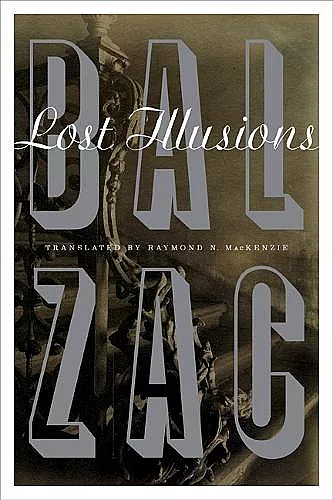Lost Illusions
A profound exploration of ambition and disillusionment
Honore De Balzac author Raymond N MacKenzie translator
Format:Paperback
Publisher:University of Minnesota Press
Published:26th May '20
Should be back in stock very soon

This novel explores the journey of a poet who moves to Paris, confronting the harsh realities of ambition and the disillusionment that follows. Lost Illusions vividly depicts societal corruption.
A new annotated translation of the keystone of Balzac’s Lost Illusions—a sweeping narrative of corrupted idealism in a cynical urban milieu. Lost Illusions is an essential text within Balzac’s Comédie Humaine, his sprawling, interconnected fictional portrait of French society in the 1820s and 1830s, comprising nearly one hundred novels and short stories. This novel, published in three parts between 1837 and 1843, tells the story of Lucien de Rubempré, a talented young poet who leaves behind a scandalous provincial life for the shallow, corrupt, and cynical vortex of modernity that was nineteenth-century Paris—where his artistic idealism slowly dissipates until he eventually decides to return home.
Balzac poured many of his thematic preoccupations and narrative elaborations into Lost Illusions, from the contrast between life in the provinces and the all-consuming world of Paris to the idealism of poets, the commodification of art, the crushing burden of poverty and debt, and the triumphant cynicism of hack journalists and social climbers. The novel teems with characters, incidents, and settings, though perhaps none so vivid as its panoramic and despairing view of Paris as the nexus of modernity’s cultural, social, and moral infection. For Balzac, no institution better illustrates the new reality than Parisian journalism: “amoral, hypocritical, brazen, dishonest, and murderous,” he writes.
In this new translation, Raymond N. MacKenzie brilliantly captures the tone of Balzac’s incomparable prose—a style that is alternatingly impassioned, overheated, angry, moving, tender, wistful, digressive, chatty, intrusive, and hectoring. His informative annotations guide the modern reader through the labyrinth of Balzac’s allusions.
"Whether or not Lost Illusions counts as the greatest novel ever written, as the literary scholar Franco Moretti claims, it’s a pretty magnificent one. You can read it for its combination of social scope and psychological insight, and for its cinematically vivid portraits of faces . . . and many fine phrases. . . . And then you can read Lost Illusions, as Marx read Balzac, for its account of the double-edged nature of early capitalism."-Benjamin Kunkel, Salon
"Reading Balzac, one can experience that sauntering pace and steady gaze that our forebears gave to their surroundings, speculations, and soul-searching. It's as with reading Hugo and Dumas, Thackeray and Dickens, George Eliot and Flaubert."-Pop Matters
"Among the pleasures of the novel is how neatly it is tied into the times, from some of the events of the times to, especially, the worlds of literature and theater. Balzac bases several of his characters on real figures, too, and MacKenzie's helpful endnotes succinctly place the who and what."-The Complete Review
"Between Lost Illusions and Lost Souls, in two hefty, handsome paperbacks-with scholarly trimmings to help, not impede a reader-we now have both of the novels (technically all seven novels in a trilogy followed by a tetralogy… published between 1837 and 1847 in not entirely chronological order… because Balzac?) tracing the fate of Lucien de Rubempre, in print as though they belong together, on your to-be-read lists and your shelves. They are a remarkable itinerary."-LitHub
"Now we are treated to a handsomely produced, new annotated version by Raymond N. MacKenzie, a prolific translator of 19th century French Literature who knows Balzac well, as his instructive introduction amply shows. "-Metamorphoses
ISBN: 9781517905439
Dimensions: 229mm x 152mm x 51mm
Weight: unknown
624 pages